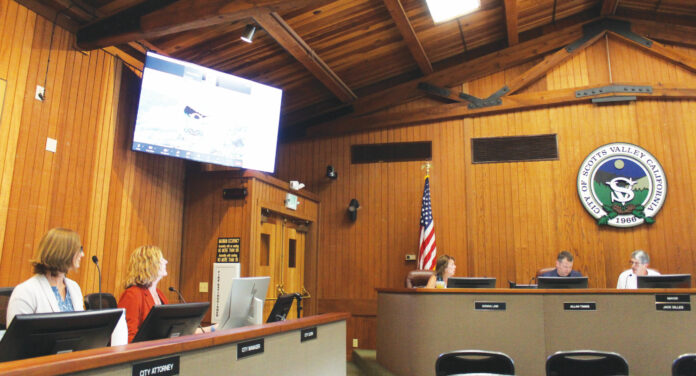
Scotts Valley Council members recently got a look at the City’s response to the Santa Cruz County Civil Grand Jury report that was highly critical of the municipality’s failure to build its fair share of housing over the years, contributing to California’s severe housing crisis.
The report was accepted as part of the Aug. 16 consent calendar and didn’t generate any discussion or public comment.
The jurors had highlighted a number of areas where they felt Scotts Valley needed to do better.
So, the City pushed back, saying—in many cases—it’s already taken action. However, staff made it clear it disagreed with other conclusions the body had arrived at.
Scotts Valley agreed, for example, with the fact that it must build housing for low-income workers, despite having fewer resources than other municipalities. And, it agreed that if there aren’t clear guidelines and incentives that prioritize local workers, out-of-towners will probably end up securing the homes in the community.
The City, however, disagreed that “evident coordination” amongst different agencies “leaves the public without independent contributions” across the groups.
Scotts Valley said it was refusing to follow the 2022 Homelessness Action Plan, which recommends Scotts Valley work with area cities to identify 20 new locations for shelters across the county and produce a progress report by the end of the year.
Staff said it wouldn’t plan to provide services for homeless people at the sites either, “including but not limited to supportive housing, case management, and medical services.”
The Civil Grand Jury wanted Scotts Valley to redesign their website to promote transparency. In fact, Scotts Valley did a redesign, including rolling out a digitized budget portal recently.
Plus, the City says it’s made significant progress on plans for mixed-use developments, another of the juror’s concern areas.
Perhaps most significantly, Scotts Valley pushed back on the Civil Grand Jury’s first finding—one that underpinned the rest of the report.
The report found that while “all city and county planning departments have demonstrated a good understanding of the new State housing laws and the need to facilitate more housing, the failure to do so in a timely manner has served to further decrease the availability of housing and further increase the need and cost of more housing.”
Staff didn’t really seem to like the apparent implication—that the City of Scotts Valley is itself at least a little bit at-fault for the countless people living on the streets, in their cars or surfing couches because of the dearth of homes across the state.
“With respect to Scotts Valley, the City follows all new State housing laws and will continue to facilitate housing production under such laws,” staff said in its official response. “With the many annual housing bills, cities and developers alike must be diligent in understanding the latest legislative changes. The City will continue to stay knowledgeable about the latest legislative changes, interpretations, and case law. It is unclear in the wording of this finding what the ‘failure to do so’ refers to. The City has not taken action to ‘decrease the availability of housing’ and the ‘need and cost of more housing’ are primarily driven by market forces, not City actions.”
And, in regards to the assertion that the City “has made little effort to develop housing for low income workers,” Scotts Valley blamed the State.
“Historically, the City had more tools to encourage and facilitate affordable housing but with the elimination of the Redevelopment Agency, those funds have been significantly reduced,” the response reads. “The City works closely with housing developers to encourage more diversity in the City’s overall housing inventory, including more rentals, multifamily, mixed use, and smaller units.”
Scotts Valley has, so far at least, made quick progress on its Housing Element, coming up with a plan for 1,220 home sites (with an apparently healthy buffer) over the coming several years and submitting this to the State in a matter of months, with the help of a consultant.
The Housing Element still has to be certified, and the municipality expects to hear back from the Department of Housing and Community Development by October.
But this was one more example where staff was able to point to how the city might be further along in terms of promoting an inclusive and welcoming environment—at least when it comes to housing—than the civil grand jurors realized.











